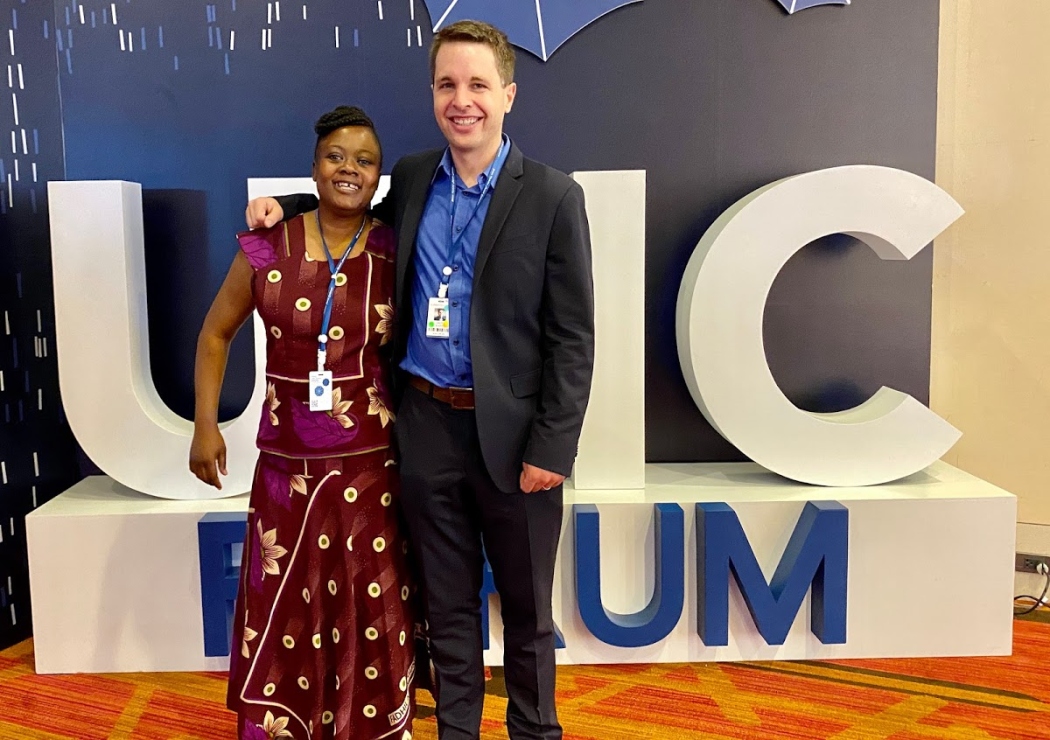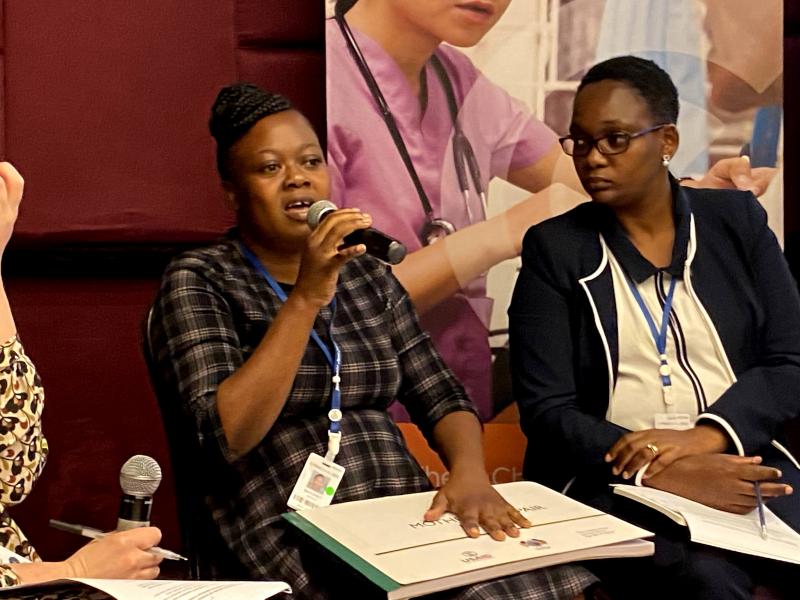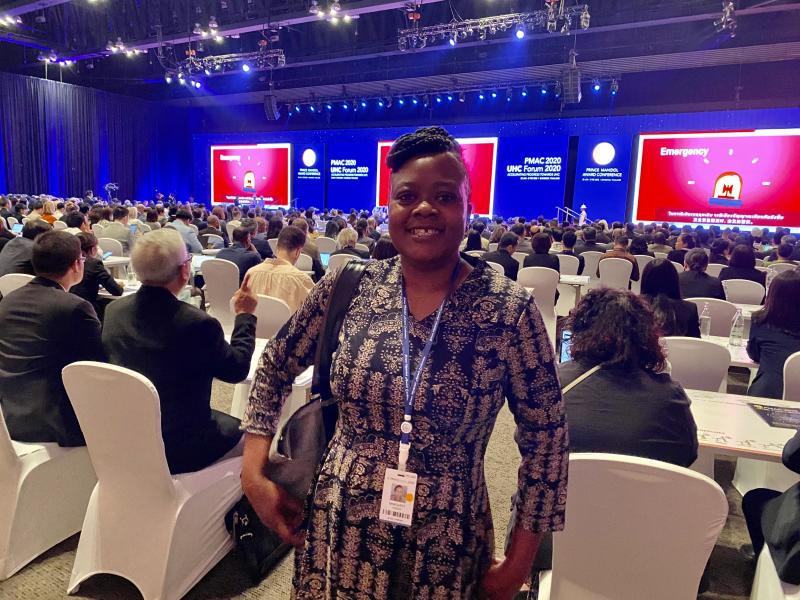To Spur Health Workforce Policy Progress, Listen to Frontline Health Workers

Community health worker Margaret Odera (left) and Vince Blaser at PMAC 2020. Photo courtesy of Vince Blaser.
BANGKOK—Community health worker Margaret Odera walked off the flight from Nairobi to Bangkok, her first plane ride, ready to take the mic.
A roomful of global health leaders from around the world could have been intimidating to anyone, but Margaret was grounded with the confidence of her fellow frontline health workers from the Mathare North Health Center in Kenya, mothers living with HIV like herself, and—most of all—confidence in her own story.

“I’ve lived with HIV for 19 years,” said community health worker Margaret Odera (left) at PMAC 2020. “I’m here speaking for those who are not heard and are suffering." Photo courtesy of Vince Blaser.
She spoke about the difficulties and discrimination she faced after being diagnosed with HIV, her gratitude to the US government-supported program that helped her deliver three babies HIV-free with an HIV-negative husband, and her determination to help other women in her community with their core health issues.
The firsthand stories of frontline health workers like Margaret are too often absent from forums like the Prince Mahidol Awards Conference (PMAC) 2020 and Universal Health Coverage (UHC) Forum last week.
But at a PMAC side session led by USAID, its HRH2030 Program, Chemonics International, and the Frontline Health Workers Coalition, Margaret transfixed our audience of researchers, policymakers, implementers, and influencers and left them more determined to play their role in improving the policies and investments frontline health workers need to deliver UHC.
“I’ve lived with HIV for 19 years,” Margaret says. “I’m here speaking for those who are not heard and are suffering. To be a voice for HIV-positive women and community health workers who do not have a voice in their communities and hospitals.”

Odera traveled to the global event in Bangkok, she said, "to be a voice for HIV-positive women and community health workers who do not have a voice in their communities and hospitals." Photo courtesy of Vince Blaser.
My take-home message from Margaret’s story and from the conference as a whole is we all need to utilize our own roles to enhance the impact of everyone’s work in global health and development.
Take the current health workforce policy rhetoric. The Universal Health Coverage Global Monitoring Report 2019 reflected what we’ve long known but now have fresh evidence to back up: communities with the least access to essential health services are the same communities where trained and supported frontline health workers are the most sparse.
It’s clear there are major gaps our macro policy progress alone cannot address.
At the macro level, there is strong momentum for action to address health workforce gaps, as the World Health Organization’s Tomas Zapata articulated at our side session. As Anne Keeling of Women in Global Health pointed out during the session, the 2019 UHC Political Declaration includes strong commitments to meeting both the health workforce needed to reach UHC and addressing some of the major barriers to gender equality in the workforce.
Zapata noted the WHO Workforce 2030 strategy, the ILO-WHO-OECD Working for Health Five-Year Action Plan and Multi-Partner Trust Fund for the health workforce, SDG 3.C reporting, and the related National Health Workforce Accounts are all major advances just in the last five years.
Yet from what we heard during our session—about Margaret’s work, about Ruth Ngechu’s leadership of FHWC member Living Goods’ work to support and empower community health workers in Kenya, about Lazare Coulibaly’s and HRH 2030/Chemonics’ work in Mali, and from Barbara Stillwell of the Nursing Now 2020 campaign on the experiences nurses face around the world—it’s clear there are major gaps this macro policy progress alone cannot address.
We heard stories of health workers from different cadres not understanding each other, of not getting enough support.
For example, proper skill mix and interprofessional teamwork and collaboration were cited by Rachel Deussom of HRH2030/Chemonics as critical to delivering high-quality, essential services to every community.
On the surface, the WHO’s first-ever guidelines on community health worker programs released in 2018 and its designation of 2020 as the Year of the Nurse and Year of the Midwife—including upcoming release of the first-ever State of the World’s Nursing Report—both seem to bode well for frontline team empowerment and cohesion.
But Margaret, Ruth, Lazare, and Barbara all relayed compelling stories of health workers from different cadres not understanding each other, not utilizing each other’s skills effectively, not getting enough support, and often not having defined career pathways.
And that is one of the reasons why Margaret’s story and her presence at PMAC and other global forums matters for improving and supporting the health workforce.
Attendees rallied behind Ruth’s plea that Margaret’s work as a mentor mother to HIV-positive pregnant women—and the work of all community health workers—should be paid. This call would not have had nearly the same resonance had Margaret not just shared her own perilous and inspiring journey.
It was not enough that Donela Besada of the South African Medical Research Council and colleagues conducted an economic return-on-investment research report of community health workers in South Africa—they needed to work with advocates to convince the South Africa Department of Health that commissioned the study to push for changes in the South African government’s recognition of community health workers.
No doubt universal health coverage is a complex, long-term, politically challenging goal.
It was not enough that Nursing Now called for greater mentorship, leadership, and career pathways for nurses—they proved how these and other gender-related barriers stymie the full impact of investment in nurses by conducting a survey of 2,537 nurses and nurse-midwives from 117 countries and reporting to policymakers and influencers on the findings with us here at IntraHealth, as well as with Johnson & Johnson.
No doubt UHC and ensuring the health workforce needed to achieve it is a complex, long-term, and politically challenging goal. But if we can connect more of the stories of frontline health workers like Margaret with the implementation experiences, research, and advocacy movements I witnessed at PMAC, we’ll be much closer to achieving that goal.
Margaret Odera’s participation at PMAC 2020 was part of an ongoing partnership between Medtronic Foundation and IntraHealth International to encourage policymakers to hear the stories and recommendations of frontline health workers at major policy forums.
